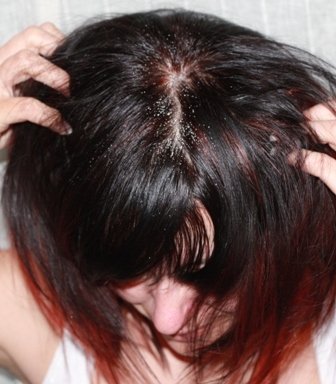Powerful Natural Remedy for Seborrheic Dermatitis...
by Barb
(Mexico)
QUESTION:
My dermatologist says I have seborrheic dermatitis. I refuse to use the expensive pharmaceutical shampoo with all of its nasty side effects. What do you recommend to treat this condition? I feel it has caused years of hair loss for me as well.ANSWER:
Seborrheic dermatitis is a type of eczema of the face and scalp. It causes red, inflamed skin that can become extremely itchy and even quite painful to touch. The scaly flakes that fall from the scalp and hair are what we commonly know as dandruff. As has been the case for you Barbara, seborrheic dermatitis can also cause hair loss.Fortunately, fixing this problem is not that difficult. You do, however, need to be vigilant and consistent in your efforts for it to work though. Here's the top 6 internal and external remedies you need to reverse this condition for good...
#1. Apple Cider Vinegar (ACV): Apple cider vinegar is definitely your number one go to remedy for seborrheic dermatitis. ACV raises your body's pH level (even though it's acidic, it becomes alkaline once in the body). A low pH level over a long period of time is the biggest trigger and precursor to seborrheic dermatitis. Raising the pH level of your body and your skin is the fastest way to cure this skin disorder.
So you MUST use the apple cider vinegar internally as well as externally for it to work. Go out and purchase some organic apple cider vinegar with the "mother" apple (do not use any other ACV) and add a tablespoon to a glass of warm filtered water with a teaspoon of Manuka honey (honey also helps with seborrheic dermatitis) and drink this concoction twice daily on an empty stomach. In addition, dilute some ACV with clean filtered water (50/50 ratio) and use this to wash the affected areas. Be sure to do this every day then apply some organic coconut oil after to moisturise (coconut oil helps with seborrheic dermatitis too).
Note: If you find it a struggle to drink the liquid ACV, you can substitute this for the ACV capsules instead. These work equally as well. And remember, to keep your seborrheic dermatitis away for good you must keep taking your apple cider vinegar for the rest of your life! This is not a prescription remedy. If you don't continue to take your ACV your body's pH level will slowly slip back down into an acidic state and your seborrheic dermatitis will return.
#2. Lugol's Iodine: Lugol's iodine works a treat for eczema AND seborrheic dermatitis. It acts in similar fashion to ACV by increasing the skins pH. The only down side to using apple cider vinegar on facial skin is it can dry it out. Lugol's iodine doesn't do this at all. You can also take iodine internally for extra benefit as well.
For external use simply dilute 2% Lugol's iodine with some clean filtered water (50/50 ratio) and apply directly to the affected area with a Q-tip (cotton bud). Hold the q-tip there for about 60 seconds before removing. It may burn a bit to begin with but this is not in any way detrimental. Repeat this process twice daily for best results. After 2-3 days you can increase the potency of the mix and even use straight iodine on your seborrheic dermatitis if you like. This will produce even faster healing. You will, however, see amazing results in just a few days.
Note: For internal use of lugol's iodine, be sure to follow the directions on the bottle. Here's what it looks like... J. Crows Lugol's Iodine.
#3. Probiotics: It has now been firmly established that an overload of bad bacteria in the gut is a major cause of all skin conditions including eczema, dandruff, psoriasis, and seborrheic dermatitis. To get rid of these harmful bad
So to get your daily dose of probiotics (which must be done every day), find yourself a good quality probiotic supplement. In addition to this, look into culturing your own foods for an extra powerful supply. "Culturing" is really taking off at the moment and the health benefits are life-saving. Here's a handy website with all the info you need to get started... Cultures for Health.
Finally, make sure you eliminate all refined sugars and acid forming foods (processed foods, meat, processed dairy, breads, etc) from your diet. These foods allow the bad bacteria to grow and thrive because this is what they feed on!
#4. Omega-3 and Vitamin D: Omega-3 fatty acids, along with plenty of vitamin D, are crucial for curing seborrheic dermatitis. In fact, one of the first signs of skin diseases is a deficiency of these essential nutrients. So make sure you take a high strength omega-3 supplement (krill oil is the best) along with some vitamin D3. The minimum recommended dose of vitamin D per day is now up to 5000 IU so make sure you get this amount. To do this, you will need a high strength vitamin D supplement.
In addition to these, be sure to eat plenty of flaxseed's, sesame seeds and chia seeds for their high omega-3 content.
#5. Honey: Honey is a potent broad spectrum antibacterial and anti-fungal food. It works a treat for removing the fungus that causes seborrheic dermatitis, both internally and topically.
A recent study proves this... In the study, 20 male patients and 10 females between the ages of 15 and 60 years with seborrheic dermatitis symptoms, including scaling, itching and hair loss, were instructed to apply diluted crude honey (90% honey diluted in warm water) every second day on their lesions by gently rubbing for a period of 2-3 minutes. After 3 hours, the honey was rinsed off with warm water. The patients were then monitored for changes in itching, scaling, hair loss and lesions during the treatment period of 4 weeks.
The results were stunning!
Study organizers stated... "Itching was relieved and scaling disappeared within one week. Skin lesions were healed and disappeared completely within 2 weeks. In addition, patients showed subjective improvement in hair loss." (1)
So to use as a topical treatment, just follow what was advised in the above study. Honey is also excellent for internal use, which is why it's included in the ACV drink remedy. Try and go for Manuka honey if you can. It's more expensive, but it works much better.
#6. Coconut Oil: Like honey, coconut oil is also a broad spectrum antibacterial and anti-fungal food that kills the fungus responsible for seborrheic dermatitis and dandruff. Use it topically as well as internally. For internal use, take a tablespoon of organic coconut oil twice daily (mixed in a smoothie, etc). For external use, follow these directions... Seborrheic Dermatitis Treatment with Coconut Oil.
Finally, don't forget to eat healthy. Plenty of raw organic fruits, vegetables and seeds are paramount. Get yourself a NutriBullet or something similar so you can make your own healthy smoothies. These appliances are so easy to use (and to clean). They're definitely worth their weight in gold!
Hope this helps you out Barb.
Good luck and all the best to you!
Regards,
Troy (Certified Holistic Nutritionist & Herbalist, Health & Wellness Coach)
P.S. Because seborrheic dermatitis and dandruff are so closely related, it would be highly worthwhile having a read of our articles on this particular health condition. Here's the link... Top 7 Home Remedies for Dandruff.
Comments for Powerful Natural Remedy for Seborrheic Dermatitis...
|
||
|
||
|
||
|
||
|
||
|
||
|
||
|
||
|
||
|
||
|
||
|
||
|
||
Recent Articles...
-
15 Powerful Natural Treatments & Home Remedies for Shingles...
Jan 15, 26 09:00 AM
Here's the most potent (and best) natural treatment for shingles yet discovered, along with other home remedies for shingles nerve pain that are a sure-fire way to get rid of this awful health problem… -
Top 10 Home Remedies for IBS Relief...
Jan 11, 26 09:00 AM
Yes, the most potent home remedy for irritable bowel syndrome you’ll come across is here, along with other natural remedies for IBS that are guaranteed to treat and heal this horrid health problem qui…


